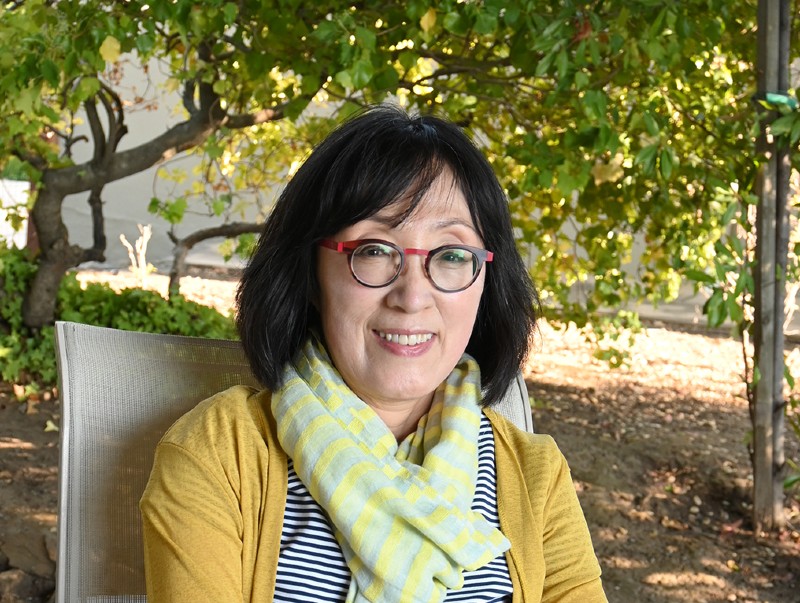On her rounds at Stanford Hospital, the Rev. Sookja Han of San Carlos considers it a “privilege” when dying patients want to share their life stories with her. “Everyone’s life story is unique,” the hospital staff chaplain says, “yet universal.” It would be hard to find a better example of that than Han’s own unlikely career path—leaving behind the venture capital world for seminary training when she could have been planning her retirement.
“I used to live a real lavish lifestyle,” Han says, dining at Michelin-star restaurants and thinking nothing of spending $10,000 on a designer handbag. “Monthly, I spent about 10 grand on myself. Buying stuff!” She hit a spiritual wall in her 40s after a cancer diagnosis that caused her to take stock of the purpose of her life, and after some long and serious soul-searching, she decided to enroll at Fuller Theological Seminary’s Menlo Park campus. Han’s plan was to get by without a salary for the three years she’d be training for the ministry, so she downsized, selling her house in Los Altos and moving to a smaller one in San Carlos. When she arrived at theology school in 2012, she was at the wheel of a holdover from the life she’d left behind: her Jaguar. She laughs at the memory. “I told people, ‘I can’t afford to buy a small car. This is all I have. So pardon my big car.’”
Born in Seoul, South Korea, into a family of educators, Han got a degree in geology with a goal of becoming a professor. Brought up Buddhist, she converted to Christianity at the age of 18 despite her parents’ opposition. Han went to college in Utah and married a fellow student. In 1982, her (now-ex) husband got a job in the Silicon Valley, where the couple raised their daughters, Michelle and Christine. Han, meanwhile, picked up another master’s degree—in computer engineering—and went to work for Apple, earning an MBA while she was there. She moved on from Apple to a succession of positions—with tech start-ups and then venture capital firms, including as managing director for the U.S. office of a Korean venture capital company. During her career, she traveled, mostly throughout Asia and Europe, seeing customers, developing markets and assembling millions of investor dollars. “I traveled almost every other week overseas,” she recalls. “I was literally up in the air most of the time.” Measured in money, corporate accomplishment, academic credentials and lifestyle, this driven businesswoman was the epitome of success, though, working late into the night, she’d ask herself “What am I doing?”
The shock of getting a breast cancer diagnosis in 2004 left her reeling. “I couldn’t really think. I couldn’t sleep. I just couldn’t anything. Nothing made sense to me. ‘Why God? Why is this happening to me’?” When her cancer turned out to be at an early, treatable stage, Han’s anger turned to gratitude. “We all talk about kind of a cliché’: We all die,” she says. “But when you become diagnosed with cancer, ‘Okay. I can die. Then what am I doing here?’” Though she felt a persistent calling to go to seminary, Han found the idea ridiculous. But as much as she protested, “God kept giving me the same message: ‘Trust me.’”
When she finally arrived for her studies at Fuller, she was one of the oldest students in her classes, where Han’s knack for learning foreign languages came in handy, as she had to learn Hebrew and Greek. Still competitive even in seminary, the straight A student was encouraged to go on for a Ph.D. “I said, ‘Thank you but no thank you.’ I want to be in the real world.’” She got her Master’s in Divinity in 2015 and then did some pastoral work at a local church, as well as some additional study until she found her niche.
Her new career as a paid chaplain was delayed, in part, by the pandemic, but Han now has about a year and a half under her belt working with patients and their families. This summer, the former high-flying corporate officer landed a fulltime job as a staff chaplain at Stanford and was also ordained at a Presbyterian church in San Mateo—at the age of 65.
It’s not her job as a chaplain to proselytize and she is available to anyone who wants to talk—among them an angry patient who gave her the finger (he eventually relented and opened up). “I used to be a fixer or a transformer,” says Han, and she’s learned to build rapport and just listen to people, sometimes still weighed down by early abuse. One heavily tattooed patient had been subjected to exorcisms as a child. “I just looked at her as a suffering human being,” says Han. Counseling people who are facing death has taught her how important it is to tend to relationships. “Almost all of my patients have relational issues,” she says, “broken relationships, estranged from their children and their siblings” that make them unwilling to patch things up even at death’s door. Han does her best to make a “healing path” for family reconciliation and to provide prayer and comfort so patients have a peaceful death.
A few years ago, she reconnected with a man she used to work with in her venture capital days who remarked on how “glowing” she looked. Han told him about her unlikely journey into the later-in-life career she finds so fulfilling: “This is really the crown of my life.”






